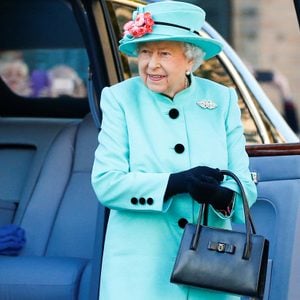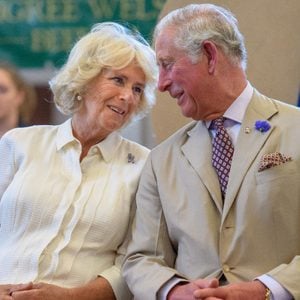What Was Queen Elizabeth’s Net Worth, and Who Will Inherit Her Fortune?
Updated: Feb. 20, 2023
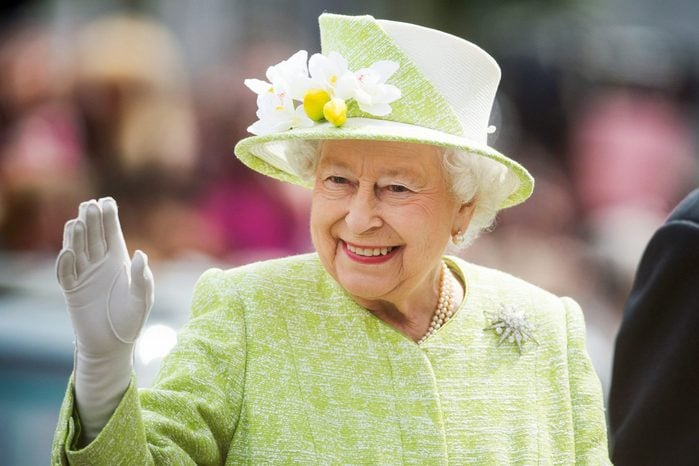
As we mourn Britain's monarch, we can't help but wonder about Queen Elizabeth's net worth—and what the rest of the royal family will inherit
It’s no surprise that as the head of the most famous monarchy in the world, Queen Elizabeth II was a very wealthy woman … but just how much was Queen Elizabeth worth? Since Queen Elizabeth’s death on Sept. 8, 2022, at the age of 96, many have secretly—or not so secretly—wondered about Queen Elizabeth’s net worth, and now that she has died, who all that money will go to. Prince Charles is king now, so it stands to reason that he will get the bulk of her fortune, but what about the rest of the royal family, including Queen Elizabeth’s grandchildren and great-grandchildren?
The British royal family’s net worth is complicated. Some of their wealth is tied up in what technically belongs to “the crown,” which includes the crown jewels and some monies that can be used only for official duties. The crown’s official assets can’t be sold, although some can be profited upon. Then there’s the queen’s private, personal fortune, which she can pass down. Although her will won’t be made public, we’ve got the inside scoop about who will inherit the queen’s wealth, including who will likely benefit the most from their royal inheritance—and who may be shut out completely. Read on to find out who’s getting what.
What was Queen Elizabeth’s net worth?
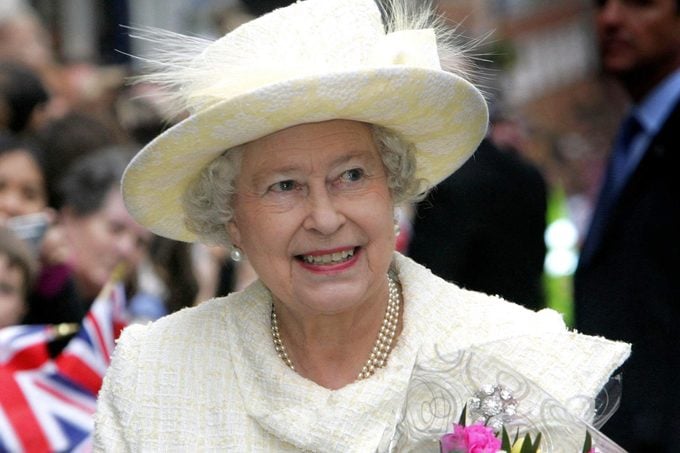
It may seem a little uncouth to talk about money at a time of mourning, but it’s only natural to wonder about Queen Elizabeth’s net worth, given the renewed focus on the cost of the monarchy. First, let’s take her personal fortune. “The late queen’s personal fortune is assumed to be between $447 million and $600 million,” says royal expert and writer Marlene Koenig. The finance experts at Forbes estimate her personal wealth to be about $500 million; the British publication The Sunday Times, which compiles an annual “Rich List” of the wealthiest people in the U.K., estimates around $430 million.
Just where did the queen get her money? “She had inherited a fortune from her father when he died in February 1952,” Koenig says. In addition, the queen inherited the queen mother’s entire estate when she died in 2002, which Koenig says was speculated to be worth more than $80 million—although Elizabeth was tasked with doling out some of this to others. Queen Elizabeth’s net worth also includes tangible assets such as jewelry, art, a valuable stamp collection, horses, stud farms, fruit farms and property, including her beloved summer retreat Balmoral Castle in Scotland, where she passed, and Sandringham Estate, where she traditionally spent Christmas.
As would be expected for someone so wealthy, the queen also had investments, but exact amounts are unknown. “She certainly had good investments with a diversified portfolio for a personal fortune of great wealth—we can only guess how much,” Koenig says. “Sums are conjecture, but we do know her private property.”
How much is the Crown Estate worth?
Queen Elizabeth’s personal wealth is separate from that of the Crown Estate, which Forbes estimates to be worth a whopping $19.5 billion. This estate includes official royal palaces and the royal collection of art and other assets, including the official crown jewels. Since her death, however, this jewelry collection has come under renewed scrutiny due to the connection between Queen Elizabeth and colonialism, as some of the jewels, such as the Koh-i-Noor diamond, which was likely mined in India and subsequently set in a crown made for Queen Elizabeth’s mother, were taken from places the British Empire invaded or colonized. It hasn’t yet been announced, however, if any of these possessions may be repatriated to where they were taken from.
The Crown Estate is a corporation separate from both the government and the monarchy that holds these property assets in trust. Since 1760, the monarchy has surrendered the revenue from these assets to the government. A percentage of that income, now called the Sovereign Grant, is issued back to the monarchy—but this money can only be used to fund official royal business, including upkeep of the royal residences, staff and travel for the royal family’s thousands of official engagements per year.
The Sovereign Grant’s percentage of profits was increased in 2017–2018 from 15% to 25% to allow for restoration of Buckingham Palace. “The Crown Estate isn’t the king’s private piggy bank, but he gets 25% of the profits,” says historian and author Tony McMahon. Due to closures from COVID-19, the Crown Estate has been less profitable than in earlier years, but the Sovereign Grant for 2022–2023 is still $96.8 million ($1.49 per person in the U.K.).
Who will inherit the queen’s wealth?
Although royal wills are not made public, Koenig is certain “everything will be left to Charles,” she says. “This includes personal property—Sandringham and Balmoral—artwork, jewelry, a stud farm and horses, among other things. All will go to Charles. All of it. Everything.” Why? “This means no inheritance tax will be paid,” Koenig says. You read that right: Wealth passing from sovereign to sovereign isn’t taxed in the U.K. We’ll get into the nitty-gritty of British inheritance tax later, but suffice to say, Charles can expect a windfall.
King Charles also will be the recipient of the Sovereign Grant to use for the monarch’s official spending. Although King Charles’s role in government is limited, as monarch he will still undertake hundreds of official engagements every year. However, Charles has long been known for his views on scaling back the monarchy, so only a short list of senior royals, aka “The Firm,” who are actually working for the monarchy will benefit from it. That list consists of Queen Consort Camilla, Prince William, Princess Catherine, Prince Edward (the queen’s third son), his wife Sophie, Countess of Wessex, and Princess Anne, the queen’s daughter.
There’s also a bit of “Duchy swapping” going on, according to McMahon. Now that William is the Prince of Wales, Charles will pass on the Duchy of Cornwall to him. That’s an estimated $1.3 billion—that’s right, billion. “But Charles picks up the Duchy of Lancaster, owned by the ruling monarch since 1399,” McMahon says. “Its assets were valued in March at £652.8 million [$748 million], delivering a net surplus to the monarch of about £24m [$28 million].” The duchy, which includes land, property and investments, was created to provide additional income for the sovereign. Like the Duchy of Cornwall, the monarch can profit from it, but selling any of its assets is strictly regulated.
What will other royal family members get?
Officially, a big, fat nothing, say Koenig and McMahon. But privately, the queen may have made known her wishes for how to distribute jewelry and other items, which Koenig says is similar to what happened with the queen mother’s fortune. “She bequeathed her entire estate to her daughter [Queen Elizabeth], and she asked the queen to make sure her bequests to members of her staff were carried out—[otherwise,] these folks would have had to pay inheritance tax,” she says. Likewise, “there may be bequests that Charles will have to carry out, including to staff, but it is unlikely that this information [regarding] the persons and bequests will be made public.”
The jewelry
What is King Charles going to do with a bunch of jewelry? Will Camilla and Kate really get nothing themselves? “Everything goes to Charles. This includes the jewels,” Koenig says. Even if the women don’t officially own them, though, chances are they’ll have their pick. “The queen has loaned jewels to Camilla and Catherine—the Delhi Durbar tiara was on permanent loan to Camilla, and I expect Charles will continue that loan,” Koenig says. “The new Princess of Wales has been lent numerous pieces including brooches, earrings, pearl necklaces and tiaras, of course. None were given to her. All were loaned. Now Charles will do the loaning.”
Beyond loans, it’s possible that some of the unofficial bequests Charles will hand out may include jewelry. “Kate, Meghan, Eugenie and Beatrice all wore glittering, priceless tiaras loaned by the queen at their respective weddings—they might reasonably expect to pick them up now, but that’s not guaranteed,” McMahon says. Pay attention to future royal appearance to see who may have received these items. “One day, we might see Princess Beatrice wearing one of the queen’s bracelets—was it a bequest or given before her death?” Koenig says.
Trust funds
“Queen Elizabeth II had trust funds for her children and grandchildren, providing them with incomes,” Koenig says. Plus, they might also have trust funds from the queen’s mother as well. “It is understood that a number of years before her death, the queen mother set up trust funds in 1994 for her great-grandchildren, with Harry getting more than William due to William’s future positions,” Koenig says. “It is understood that there were also trust funds for grandchildren (Queen Elizabeth’s children).”
The royal dogs

Other relatives have inherited possessions of the four-legged kind. “The Duke of York [the queen’s second son, Prince Andrew] has adopted Queen Elizabeth’s corgis, as he had given them to the queen after [the queen’s husband] Prince Philip died, and a staff member may take the other two dogs, a dorgi and cocker,” Koenig says. Although Andrew has been relieved of his public duties (and won’t even be allowed to wear his military uniform at Queen Elizabeth’s funeral) because of allegations of sexual abuse, he and his ex-wife, Sarah, Duchess of York, both still reside on the grounds of the Windsor estate and will likely continue to do so, although it’s unknown if they will receive any other particular bequests.
What about Harry and Meghan’s inheritance?
Harry’s reports of being “cut off” in the couple’s 2021 interview with Oprah Winfrey may have referred at least in part to money distributed to him as part of the Sovereign Grant, as he was no longer a working royal after their move to California. But as one of the queen’s grandchildren, according to Koenig, he would have a trust fund from her. And as grandchildren of the current monarch, Harry’s children, Archie and Lilibet, may now be upgraded to prince and princess titles (although styled without His/Her Royal Highness, since their family doesn’t consist of working royals). However, this may be up to Meghan and Harry; for example, Princess Anne and Prince Edward chose not to give their children princely titles.
Apart from Prince William, none of the queen’s other grandchildren—Prince Harry, Princesses Beatrice and Eugenie, Zara Tindall, Peter Phillips, Lady Louise Windsor nor James, Viscount Severn—are working royals, so they won’t be benefitting directly from the Sovereign Grant. That said, the youngest two, teenagers Louise and James, will benefit indirectly, since their parents, Prince Edward and Sophie, Countess of Wessex, are working royals.
Does the royal family have to pay an inheritance tax?
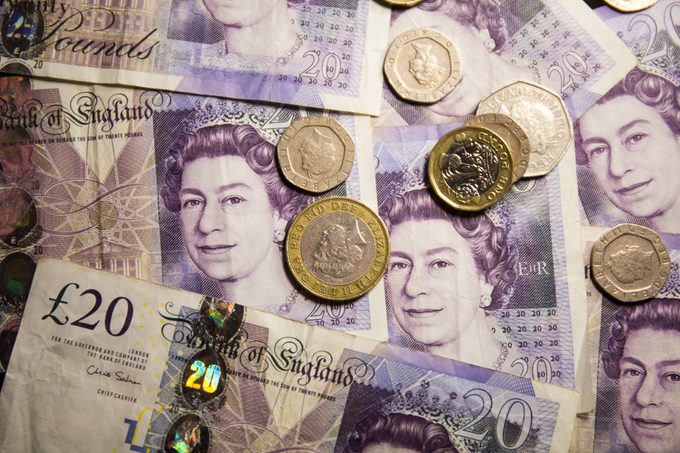
In some instances, no. Why not? First, it makes sense that there would be no inheritance tax on the Crown Estate or Sovereign Grant, as that wealth belongs to and is spent on the monarchy as an institution, not as an individual. This rule also applies to the assets of the Duchy of Lancaster.
The new sovereign, however, is also exempt from paying inheritance tax when receiving personal wealth from the previous monarch or consort of a previous monarch, a royal family perk that has struck some as unfair. “Under an agreement reached between Buckingham Palace and the government of Prime Minister John Major in 1993, no inheritance tax is paid when the wealth of a dead monarch is passed on to the next in line for the throne,” McMahon explains. “Ordinary Britons, meanwhile, pay an eye-watering 40% above a certain threshold on their more meager inheritances.”
What’s the rationale behind this law? Here’s what the official government memo on the topic says: “The reasons for not taxing assets passing to the next Sovereign are that private assets such as Sandringham and Balmoral have official as well as private use, and that the Monarchy as an institution needs sufficient private resources to enable it to continue to perform its traditional role in national life, and to have a degree of financial independence from the Government of the day.”
Basically, their wealth is part of the brand of the royal family, a British brand that the royals have carefully crafted and is estimated to have an intangible value of $48 billion, according to a pre-pandemic estimate by brand valuation firm Brand Finance. A monarchy in reduced circumstances would also reduce the value of that brand for the U.K. This rule, though, is why the queen likely left her entire personal fortune to Charles; if she gives it to anyone else, it is subject to inheritance tax.
That said, it’s possible that King Charles may pay some amount of inheritance tax to appease criticism. After all, Queen Elizabeth did voluntarily start paying income and capital gains taxes in 1993, as did Prince Charles on the profits from the Duchy of Cornwall.
Is the royal family the richest family in the United Kingdom?
No, not by a long shot, if you count only their personal wealth and not that which belongs to the crown as an institution. Queen Elizabeth and family didn’t even make The Sunday Times‘s 2022 “Rich List” of the 250 richest people and families in the U.K. The British royal family members are millionaires but not billionaires, so they don’t come close to, for example, Sir Richard Branson and family ($4.9 billion) or vacuum mogul Sir James Dyson and family ($26.6 billion). Who is the richest member of the royal family? Not surprisingly, it was the queen, and now King Charles, followed by Prince William.
King Charles is aware of public perception that the monarchy is an expensive institution, and he is going to look to tighten the royal purse strings and keep official costs down for British taxpayers. Charles may be also planning to give the public greater access to royal estates, both official and private, in order to provide more revenue and use for the properties. As for Queen Elizabeth’s net worth, there’s no doubt that the Windsors are a wealthy family and will continue to remain so for generations to come as she passes down her vast personal fortune.
Sources:
- Forbes: “Inside ‘The Firm’: How The Royal Family’s $28 Billion Money Machine Really Works”
- The Times: “The Queen Net Worth: Sunday Times Rich List 2022”
- Royal.uk: “Royal Finances”
- Royal.uk: “Financial reports 2021-22”
- Gov.uk: “Sovereign Grant Act 2011: guidance”
- The Crown Estate: “Our Structure and Governance”
- Duchy of Lancaster “Financial”
- The Prince of Wales: “The Duchy of Cornwall”
- HM Government: “Memorandum of Understanding on Royal Taxation”
- Brand Finance: “Monarchy 2017”
- The Times: “The Sunday Times Rich List 2022”


